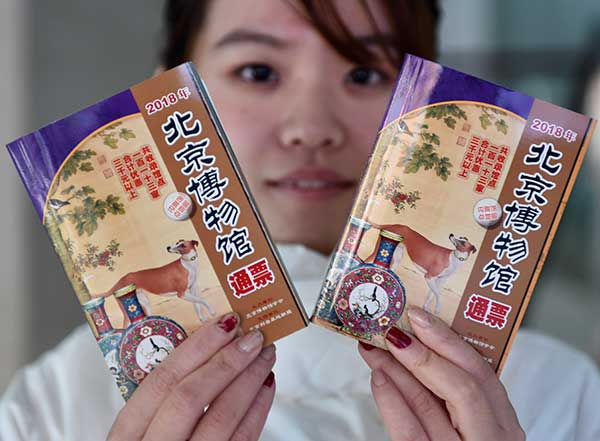Ticket book opens doors to museums
 |
|
The 2018's Beijing museum ticket package goes on sale in Beijing on Thursday.[Photo by Luo Xiaoguang/Xinhua] |
Sightseers in Beijing are now able to buy a book of tickets covering 113 museums in the nation's capital.
The package, costing 120 yuan ($18), allows visitors into the listed museums for free or at a discount in 2018. It was released by the Beijing Museums Association on Thursday.
The booklet also provides a brief guide, such as contact and transportation information, for each institution.
"People will be willing to visit some of the impressive museums in Beijing more often because of the lower entry threshold," said Cao Wei, general manager in charge of the tickets.
Each ticket can be used by two adults, which encourages family visits to museums. Children already enjoy free or discounted entry to many museums in Beijing.
The list of museums includes key historical sites around the city's old communities, such as the Confucius Temple and Guozijian (imperial college) Museum, Beijing Stone Carving Art Museum in Wuta Temple and Deshengmen tower.
Tickets are also applicable to the country's top-tier science museums, such as the Beijing Planetarium, National Zoological Museum and the China Aviation Museum.
Most tickets are for publicly owned museums, but some renowned private museums are listed as well, including a gallery of rare art focused on Mayan culture.
The Palace Museum, also known as the Forbidden City, is not included.
Visitors can buy the ticket books at post offices, museum ticket offices and Xinhua bookstores in Beijing. The books are also available on WeChat and Taobao.
"It's convenient that the tickets offer many choices and save money," said Li Rui, a Beijing-based office worker who often visits museums.
It would cost more than 3,000 yuan to buy all the entry tickets individually.
"However, one year is too short," she said. "I can only pick some."
Beijing has 179 registered museums, ranking second in the world after London.
"Visiting museums is a way for Beijing natives to rediscover the glamour of this city, which originates in their childhood memories," Cao said. "It can also help migrants to Beijing acquire emotional attachments."
Zhu Hong, a 68-year-old retired chemistry teacher, has been a volunteer tour guide in Beijing museums for 15 years. He expected to see more organized tours.
"I'm getting old," he said. "Maybe more young people will join me to be volunteers if they visit museums more frequently and gain more professional knowledge."














